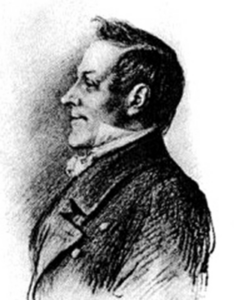Evening star
(Poet's title: Abendstern)
Set by Schubert:
D 806
[March 1824]
Was weilst du einsam an dem Himmel,
O schöner Stern? und bist so mild;
Warum entfernt das funkelnde Gewimmel
Der Brüder sich von deinem Bild?
“Ich bin der Liebe treuer Stern,
Sie halten sich von Liebe fern.”
So solltest du zu ihnen gehen,
Bist du der Liebe, zaudre nicht,
Wer möchte denn dir widerstehen?
Du süßes eigensinnig Licht.
“Ich säe, schaue keinen Keim,
Und bleibe trauernd still daheim.”
Why do you stay alone in the sky
Oh beautiful star, particularly since you are so gentle?
Why does the sparkling swarm stay so distant,
Why do your brothers avoid your image?
“I am the faithful star of love,
They keep their distance from love.”
That is why you should go to them,
If you are love, do not hesitate!
For who could resist you?
You sweet, stubborn light.
“I sow the seed, I see no shoots,
And I remain quietly lamenting at home.”
All translations into English that appear on this website, unless otherwise stated, are by Malcolm Wren. You are free to use them on condition that you acknowledge Malcolm Wren as the translator and schubertsong.uk as the source. Unless otherwise stated, the comments and essays that appear after the texts and translations are by Malcolm Wren and are © Copyright.
☙
Themes and images in this text:
Being solitary, alone and lonely Brothers and sisters Evening and the setting sun Germination, shoots and sprouting Heaven, the sky Hesperus, the evening star (Venus) Home (Heimat) Light Near and far Noise and silence Seeds Stars Sweetness
Knowing too much about an author’s life can be dangerous. It is almost impossible to read many of the poems of Sylvia Plath as anything other than a prefiguring of her death by suicide, for example, even if we attempt not to let this distort or limit the power and range of her verse. Once we know about the tumultuous relationship (involving attempted murder at one point) between Rimbaud and Verlaine it becomes very difficult to read their poems on their own terms, rather than as the utterances of ‘a gay poet’ or ‘an addict’. In the case of Johann Mayrhofer, most commentators do not even attempt to avoid falling into the trap. ‘Der Sieg’ (Schubert’s D 805) is seen to be ‘about’ suicide (since he famously attempted to drown himself in the Danube before eventually defenestrating himself) and ‘Abendstern’ must be ‘about’ his homosexuality, the condition which made him so isolated and (as many assume) contributed to his depression.
Of course, there is enough evidence in ‘Abendstern’ to allow this biographical reading. The Evening Star [1] is not like the other stars. He is devoted to love but his brother stars keep their distance from him, and he refuses to approach them. He sows seed which will never germinate, even though he has the power of inspiring love. These are the standard tropes about homosexuality, and it may well be that Mayrhofer did indeed see his position in society in these terms.
That does not imply, though, that his poem was intended as a personal lament or a plea for sympathy with him as an individual. If there is any element of personal experience here it is being used to communicate with others who might feel similarly disconnected or misunderstood in their own environment. He is imagining the voice of a love that CAN speak its name, a love that inspires love in others without being loved in return.
[1] Venus, but throughout the poem the Evening Star is seen as male (the word ‘Stern’ / star is a masculine noun in German).
☙
Original Spelling Abendstern Was weilst du einsam an dem Himmel, O schöner Stern? und bist so mild; Warum entfernt das funkelnde Gewimmel Der Brüder sich von deinem Bild? "Ich bin der Liebe treuer Stern, Sie halten sich von Liebe fern." So solltest du zu ihnen gehen, Bist du der Liebe, zaudre nicht! Wer möchte denn dir widerstehen? Du süßes eigensinnig Licht. "Ich säe, schaue keinen Keim, Und bleibe trauernd still daheim."
Confirmed by Peter Rastl with Gedichte von Johann Mayrhofer. Wien. Bey Friedrich Volke. 1824, page 96.
To see an early edition of the text, go to page 96 [110 von 212] here: http://digital.onb.ac.at/OnbViewer/viewer.faces?doc=ABO_%2BZ177450902


